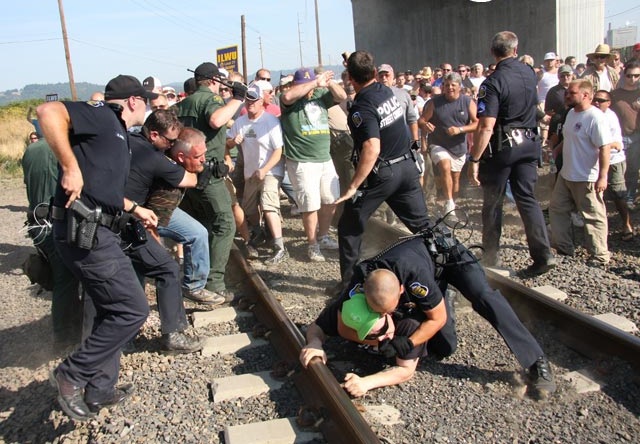forum
library
tutorial
contact

US Bill to Prevent Port "Slowdowns"
by StaffWorld Cargo News, June 7, 2015
|
the film forum library tutorial contact |

|
US Bill to Prevent Port "Slowdowns"by StaffWorld Cargo News, June 7, 2015 |
 US Senator Cory Gardner has introduced a bill to amend the National Labor Relations Act (NLRA) to expand the Taft-Hartley mechanism to cover port slowdowns as well as strikes, lock-puts and other closures.
US Senator Cory Gardner has introduced a bill to amend the National Labor Relations Act (NLRA) to expand the Taft-Hartley mechanism to cover port slowdowns as well as strikes, lock-puts and other closures.
Taft-Hartley is a 1947 law that places limits on the power of unions to strike, and has been used before to obtain injunctions requiring that port operations resume, including by President Reagan in 2002 to end an 11-day lockout.
Senator Gardner's "Protecting Orderly and Responsible Transit of Shipments Act of 2015" (PORTS Act) would provide state provide governors a mechanism to invoke Taft-Hartley emergency powers in the event of a disruption, including an orchestrated labour slowdown.
A wide variety of shippers and commercial organisations wasted no time congratulating Senator Gardner and giving the bill their support. In a letter to Senator Gardner over 100 such groups said "We believe this approach correctly reforms the Taft-Hartley process to promote government action in response to the great harm these disputes cause our national economy. Most importantly, the bill clearly defines and expands situations in which Taft-Hartley can be invoked, preventing legal ambiguity from causing inaction"
Though the backlog on the west coast has largely cleared, the groups were very clear about the impact of the dispute on commerce. "...the operational meltdown we have just experienced is a chief cause of the negative growth of the nation's GDP in the first quarter" they said.
The shippers also point out that even when no dispute eventuated, such as during the 2012 action on the East Coast contract negotiations, shippers have to make costly plans and divert cargo "to avoid threatened disruption". This is something both terminal operators and the Unions have tried to avoid, but the contract bargaining process, which often has no urgency right up until a contract expires, only helps foster uncertainty.
The Union response has been equally strong. Edward Wytkind, president of the Transportation Trades Department, AFL-CIO (TTD), called the bill "a blatant overreach by corporate interests whose sole objective is to eviscerate the collective bargaining rights of port employees. The Gardner bill would also have a severe chilling effect on labor-management relations in our nation's ports by tilting the playing field in management's favour."
TTD strongly opposes anyone but the President having jurisdiction under Taft-Hartley. "During the recent port bargaining dispute on the West Coast, the President dispatched his Secretary of Labor who revived talks and helped the parties reach a new agreement. This is the way the bargaining process should work.
"By vesting governors with unique powers previously reserved for the President, Senator Gardner's proposal would pervert the collective bargaining process by subjecting it to potentially sinister political motives that have no place in labor-management negotiations" Wytkind state.
learn more on topics covered in the film
see the video
read the script
learn the songs
discussion forum
